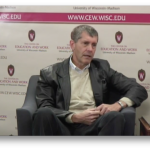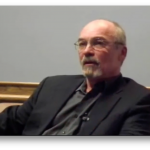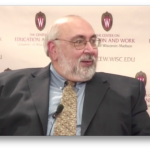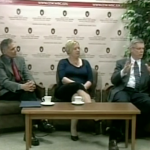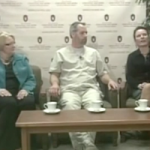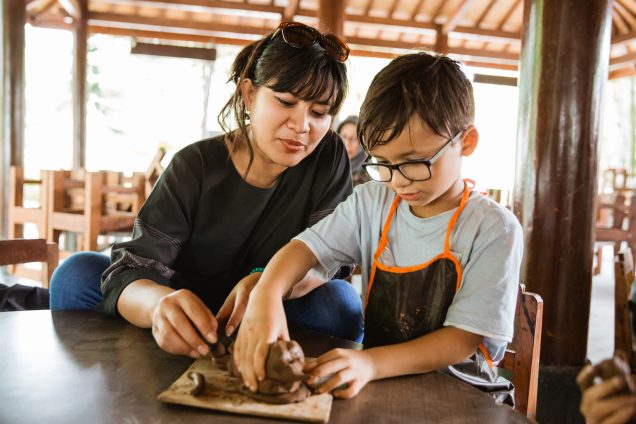Afternoon Tea Seminar Series
Afternoon Tea seminars were a series of conversations on career and workforce development in which V.Scott Solberg, Ph.D, who is currently a professor in counseling psychology at Boston University, conducted casual interviews with distinguished researchers and faculty in the field of vocational psychology. Afternoon Tea seminars were organized by the Center on Education and Work at University of Wisconsin-Madison.
Trian Tracy is a distinguished professor in counseling psychology at Arizona State University. He talked about a wide range of methods of career interest assessments.
Steven Brown, Ph.D. is a well-known faculty at Loyola University Chicago and a co-author of Social Cognitive Career Theory (SCCT). His talk focused on career decision-making difficulties as one of the major issues in career interventions and its solutions.
Mark Savickas, a professor at Northeastern Ohio Universities College of Medicine, is the author of Career Construction Theory and demonstrates a narrative method for helping clients in career counseling.
Ellen Henson is a senior employment service specialist in International labor Organization in Switzerland. She talked about global challenges especially career development needs of low- and middle-income countries.
John Vardallas is a founder and CEO of the American Bloomer sharing his perspectives about “All Things Bloomer.”
Dennis Winter is an expert and economic analyst modeling and forecasting and a vice-president and research of North Star Economics.
The conversation focused on learning what makes competitive and employable in today’s changing economy.
Graduate students who returned to college as an adult shared their experiences and resources they used to help them become successful and navigate challenges of going back to school.
The Sky Is The Limit: How To Build Children’s Career Development Skills This Summer
The Sky Is The Limit: How To Build Children’s Career Development Skills This Summer
By Yutong Yuan, Rebecca Markarian and Kimberly A.S. Howard
As any parent can attest, children never cease to amaze us. Their curious brains are constantly
active, exploring the world around them, observing the adults in their lives, and creating
meaning of discoveries they make and patterns they recognize. It should come as no surprise,
then, to learn that whether or not we see it happening, children are forming ideas about the
world of work by watching what the adults around them do for work and how they do it.
This spring we saw schools across the country - and across the world - close in response to the
COVID-19 pandemic. Millions of children remained at home for more than three months,
finishing their spring semester through remote learning. While summer camps have opened up
in a number of states, many parents will continue to keep their children home for the summer,
either by choice, because of limited access to camp opportunities, or for health reasons.
So how will parents and families fill those summer days with their children? Summer provides
idle time that can fuel exploration and creativity, as well as chances to bolster or complement
the academic learning that occurs during the school year. With just a little planning, summer
time activities can spark imagination and start our children on a healthy path of career
development.
Here are seven summertime strategies to help facilitate children’s exploration of occupations
and the development of a simple, foundational understanding of how people prepare
themselves for future work.
1. Draw it out: Bring coloring supplies or chalk to a local park with your children and
spread out your materials. Start by talking with them about what subjects and activities
they enjoy the most. Then, ask your children if they can draw a job related to their
preferred subjects or activities. Art is an active way for children to explore their identity
and express their natural feelings, thoughts, hopes, and dreams. Visualizing their dream
job is a helpful first step in exploring different career paths for children.
2. Use playdough to create what they want to be: On a rainy summer day that you are
stuck inside, set up a playdough activity area on your kitchen table. Let your children use
playdough to create what they want to be and discuss the education and skills involved with
doing their dream job. You can wonder aloud together about different career pathways and
pose questions to playfully explore. For example, you could ask: what do you think you have to
learn to do your dream job, can you show me? Sculpting and modeling with playdough can
improve children’s social emotional development and increase their initiative and curiosity.
Creating what they want to be allows children to form new ideas and concepts about the world
of work which are essential for supporting their own career development.
3. Dramatic play: Engage in dramatic play with your children at your next picnic. Before
heading out of the house, let your children select costumes to bring along with you. You can let them pick from items at home or go out shopping for a new costume or props. Find a more
secluded spot in a park or playground to set up your picnic. As you enjoy your time outside,
provide opportunities for children to dress-up and role play in their costumes. See what
responsibilities and objects they associate with their occupations. After they act, ask them
questions such as: do you enjoy doing the tasks that this job requires? As children take on
different roles, they start to develop beliefs about what abilities and characteristics are needed
for these occupations in the real world. Encouragement during the exploration process can help
support your child’s confidence in relation to different careers.
4. Invite friends over that have a job of interest to your children, and let them talk about
their work: Promote career exploration by asking children to ponder the nature of different
types of work. Ask if your children know: the amount and type of training required for jobs they
are interested in, what skills someone would need in that occupation, and where they would
get specific training. If your children do not have answers, don’t worry! You’re starting at
square one now, and you can help your children find additional information over time. Invite
friends over that have careers your children are interested in and encourage your children to
collect information from them. All of this can be done on a nice day in your backyard while
staying socially distant. The goals here are to illustrate what enthusiasm looks like for a
particular profession and to demonstrate one way of investigating careers of interest.
5. Create a timeline with children for their expected future job: For children in later
elementary school, a timeline helps to set the stage for thoughtful career planning. It allows
children to understand the concrete steps and actions needed to attain their career goals. You
can plan a coffee and lemonade hour with your children outside, and work on creating a
timeline together. Questions you ask may include:
- What education and training are needed for the careers that you are interested
in pursuing? (i.e. Do these careers require a high school diploma, trade
certificate, bachelor’s degree, master’s degree, or doctorate degree?) - What skills and qualities will you need for the careers that you're interested in?
- Which subjects and courses will help you develop those skills?
6. Share stories of famous people: Many famous people reached the height of their career
after first experiencing failure. By learning the inspiring stories of those that have found success
through failure, children can learn why persistence is key to pursuing their ideal career path —
or paths. Before bedtime, ask your children if they would like to hear about the story of
someone who has found success after failure. If they are interested, read a book or share some
of these inspiring stories you know of with them. Ask them what they learned from these
stories. Understanding that failure is a part of the process will help children develop self-
management skills to better cope with setbacks in their career plan.
7. Share your passions: Take a walk with your child after dinner and enjoy the fresh air. On
your walk, ask your children if they want to know more about how you got your job and what
you love about your job. If they are interested in learning more, then demonstrate your enthusiasm for your job and take time to explain why you are passionate about the work that you do.
Summertime is an opportunity to have fun and to stoke your children’s curiosity about the
world of work. Ask your children what they want to be when they grow up. Help them explore
their interests while doing some fun activities. Remember to keep it simple, keep it positive,
and be ready to help them imagine the possibilities ahead of them.
Career Advising Toolkit for Higher Education
Dr. Solberg is collaborating with career specialists from two universities and Rhonda Basha, a former policy analyst from the U.S. Department of Labor, to produce a career advising toolkit for higher education institutions. The toolkit is an extension of Drs. Solberg and Martin’s work on individualized learning plans and will include resources that target high need populations that historically have not completed their postsecondary education. These populations include youth with disabilities, lower income youth, and youth from underrepresented racial/ethnic backgrounds. The project is supported by a masters student Yajing Chen.
Career Development Challenges in Rural Communities
In Spring 2020, Dr. Qi and Solberg launched a comparative study of promising career and workforce development efforts in rural areas of China and the U.S.
Supporting Career and Life Goals among UK Football (Soccer) Academy Youth
The project is led by a Doctoral Student Mason Blake specializing in Sport Psychology. He is studying and designing curriculum to support the career development of UK youth involved in Football academies. He is conducting an online survey of UK youth that will be used to assess their SEL and resiliency skills with respect to both their academic and football skills and the relationship between these skills and coaches’ ratings of their football abilities, wellness, and career and life goals. Mason will develop career development modules that will be delivered to the youth in Summer 2020.
State Leaders Career Development Network
This Network began as part of a grant from the National Collaborative on Workforce and Disability for Youth (NCWD-Youth) and is currently coordinated by Dr. Solberg. This Network includes leaders from over 30 states who meet monthly to discuss their career development implementation efforts, especially as they apply to the use of individualized learning plans (ILP's). Participants include leaders from state education agencies (e.g., school counseling, special education, career and technical education, college and career readiness), state workforce development agencies, vocational rehabilitation agencies, and higher education. This group meets once a month to share how they are engaged in the design, implementation, and evaluation of career development and specifically ILP-related activities. Participants share resources, ask questions, discuss challenges, and learn innovative strategies on how to introduce, implement, and evaluate individual career planning processes for youth.
The Vocational Rehabilitation Youth Technical Assistance Center (VR-TAC)
The Institute of Educational Leadership (IEL) manages this 5-year grant awarded by the Rehabilitation Services Administration, and we are responsible for evaluating the technical assistant training. The project goals are to increase capacity among state Vocational Rehabilitation staff to more effectively support the career and workforce development needs of youth with disabilities as well as other high need youth populations such as homeless youth and those involved in the foster care and juvenile justice systems. We are in the fifth year of this evaluation project directed by Drs. Martin and Solberg with support from doctoral students Hayoung Kim and Bushra Ismail and masters students Turner Block and Yanling Dai. The project team develops evaluation tools, analyzes the results of the various evaluation efforts, examines the overall impact of this work, and prepares reports that the federal government will use to assess the efficacy of the technical assistance efforts and determine future technical assistance needs.
SEL IRN Project: Cross-Cultural Research on Social Emotional Learning and Career Development
This cross-cultural investigation of educator perceptions regarding the nature and value of social emotional learning (SEL) is led by Drs. Solberg and Park at BU and Dr. Lea Ferrari at the University of Padova, Italy. Research teams from 18 countries are participating, and the World Research Education Association has formally recognized the work as an International Research Network (IRN). Research team members have been analyzing SEL themes that emerged from the data collected in 2019 and developing a new survey that will be used in a multi-national data collection in 2020. The analysis of the new survey will be supported by a doctoral student Hayoung Kim. The team uses a social justice and liberation psychology lens to analyze the data. In Spring 2020, the IRN launched an international webinar series on SEL and Career Development.
Click here to see our accomplishments in 2020.
Invest In Girls
Drs. Howard, Solberg, and Park are involved in an evaluation of Invest in Girls, a financial literacy program offered in private and public high schools. We are in the process of conducting a longitudinal study of the impact of the program on young women’s career and life trajectories. We are interviewing the first cohort of 15 high school graduates/seniors during the 2019-2020 academic year to find out what their transition from high school has been like and whether and how their financial literacy experiences may be shaping their career and life decisions. The project is supported by three masters students Yanling Dai, Turner Block, and Emma Kraus.
NSF ITEST Project with Sociedad Latina
In collaboration with Paul Trunfio, a Senior Research Scientist in the Department of Physics, Drs. Solberg and Howard launched a new collaboration with a community-based organization in Boston that offers after-school enrichment for Latinx youth. Funded by the National Science Foundation, we work with Sociedad Latina to incorporate My Career and Academic Plan (MyCAP) activities to support middle school youth’s academic and career development. We conduct research on after-school career development activities, design and implement STEM curriculum. The project is managed by Dr. Park with support from masters students Yanling Dai, Turner Block, and Emma Kraus.
Sample MyCAP lessons are available here.
Guideposts for Success
The transition from youth to adulthood is challenging for almost every young person. This is particularly true for young people with disabilities. Yet, it is in those critical transition-age years that a young person’s future can be determined. Part of a successful future includes finding and keeping work. The total employment rate is projected to increase by 15% in the first decade of the twenty-first century. Employment in occupations that generally require a college degree or other postsecondary credential is projected to grow much faster than other jobs across all occupations. Jobs requiring work-related training will still account for the majority of the new positions. To read the full report, click here.
